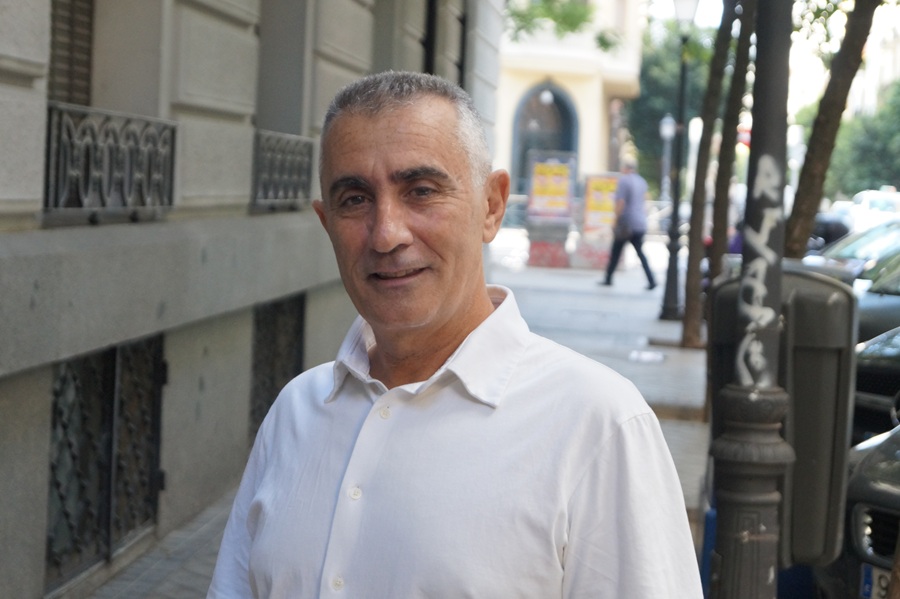- Face to face
- 20 de October de 2025
- No Comment
- 11 minutes read
“More than student-centred learning, what we really have is pedagogue-centred education”

Ramón Espejo / Photo: Courtesy of the author
FACE TO FACE WITH
Ramón Espejo Romero, Senior Lecturer in the Department of English Studies. University of Seville
I can only pay tribute to both the words and the gestures of Ramón Espejo. A Senior Lecturer in the Department of English and North American Studies at the University of Seville, he articulates with uncommon clarity what is obvious to all in education yet seldom acknowledged: the breakdown of our national education system.
A specialist in American literature and theatre, his research has focused on authors such as Arthur Miller, Edward Albee, Tennessee Williams and Eugene O’Neill, while also exploring the influence of North American theatre on the Spanish stage throughout the twentieth century.
His most recent book, El laberinto educativo y el aprendizaje fake, offers a critical analysis of the current state of the Spanish education system, amplifying the voices of teachers and professionals who face the daily realities of the classroom. This interview was, quite simply, indispensable for Educational Evidence.
What prompted you to write El laberinto educativo y el aprendizaje fake?
I suppose it stemmed from a concern about the state of education—and a desire to understand more clearly what is actually happening, and why. Unfortunately, it is a subject so polarised, politicised, and riddled with silences and manipulation that distinguishing truth from falsehood becomes extremely difficult. Personally, I have always felt that we often take the long way round to travel a very short distance—like those costly studies that end up proving that 99% of people feel less hungry after eating. In this case, the most reliable way to discover what is really going on was simply to ask those who are there every day, on the front lines. That is exactly what I did: I asked, and I asked many. In the book, I share with readers what they told me.
“On the surface, the parties seem to hold divergent views on education, yet in practice they agree on almost everything”
In your book you mention that debates on education in Spain are clouded by political bickering and technical jargon. How does that affect the quality of teaching?
In my view, these are two very different issues. Political bickering, in reality, isn’t genuine. That was one of the main findings of the book—and something I never anticipated when I began writing it. On the surface, the parties seem to hold divergent views on education, yet in practice they agree on almost everything. Perhaps their motivations differ, but the education we have is precisely what politicians want us to have—and I mean all of them. They’ve identified a handful of issues on which to disagree publicly, creating the illusion of difference, but it’s all smoke and mirrors. Without an alternative educational model, there is little hope for improvement. We are exactly where they have led us—and where they want us to be.
As for the supposedly technical jargon, it is another kind of façade—what Javier Orrico, in the book’s prologue, calls a trompe-l’œil. It conceals the lack of rigour in that science without a scientific method that we call pedagogy, and it elevates to the status of experts those who merely express opinions and wishes, passing them off as unquestionable truths.
What do you mean by “fake learning”, and how does it manifest in today’s classrooms?
Families naturally assume that their children go to school to learn. Everything about the routine reinforces this belief. They wake early, pack their rucksacks, attend buildings that look like schools, complete homework, receive grades—everything appears normal. Yet the reality is that pupils are learning less and less, if they are learning anything at all. Some may be entertained, a few may even pick up something, but the limited data we have point to an alarming decline in genuine learning. If, as Álvaro Marchesi once told me, we have the best education system in history, then why are pupils acquiring less knowledge and fewer skills? Countless activities, classes with English-sounding methodologies, hours spent in the classroom—all of this should indicate learning is happening. It isn’t. Like fake news, it looks one way, but sadly, it is another.
“If, as Álvaro Marchesi once told me, we have the best education system in history, then why are pupils acquiring less knowledge and fewer skills?”
What exactly is “student-centred learning”? And what scientific evidence supports it?
In my view, “student-centred learning” is just another empty buzzword—one that claims pupils can learn independently, without teachers who possess real expertise in their subject. I don’t know a single teacher who teaches for their own sake. We all work for our students. Some do so with genuine commitment, others simply to get by, but ultimately every teacher—except perhaps the occasional egomaniac who enjoys the sound of their own voice—has always placed the student at the centre. This has been true since teaching began.
Pedagogues use the term “student-centred learning”—a rather simplistic truism—to discredit anything that challenges their ideological comfort zone. They dislike the idea of teachers actually teaching, and have attempted to dismantle it under the guise of “student-centredness”.
As for scientific evidence, only around 10% of what is claimed to be “scientific” in education truly is. And that 10% does not, in fact, support most of what has recently been promoted as “scientific”—including, notably, student-centred learning itself.
What are the main consequences of this educational crisis for society at large?
It is a society growing increasingly hollow and superficial, lacking judgment, desperately consumerist, quick to believe anything, and obsessed with the here and now. A society in which addictions multiply exponentially, where the mobile phone has become the centre of our lives, and where many minds seem to collapse at the first encounter with an argument longer than two sentences. A society of young people pre-loaded with unhappiness and cynicism, in which little seems to matter because hope has been lost, and we no longer know who we are, where we are headed, or even where we might want to go.
“Pedagogues use the term ‘student-centred learning’—a rather simplistic truism—to discredit anything that challenges their ideological comfort zone”
How do bureaucracy and the imposition of new methodologies affect teachers’ daily work?
Bureaucracy is yet another instrument of control—and it’s often used against teachers, to keep them in check. The mediocrity of the political class leads them to believe that stacks of completed paperwork mean the system is under control, when in reality it’s completely out of control. The forms get filled in, but no one takes them seriously: those above don’t care what they contain, and those of us below have learned to fill them out just to get by. Still, it’s disheartening for teachers to waste their time on this instead of devoting it to far more meaningful tasks.
As for methodologies, they are now at the very centre of the system. More than student-centred learning, what we have is pedagogue-centred education. It’s the pedagogues—and their whims—who truly occupy the centre of the stage. For teachers who genuinely want to do their work well, that’s profoundly demoralising and only accelerates the system’s decline.
What measures do you consider essential to restore quality and critical thinking in state education?
Dialogue—honest, genuine dialogue. There’s a glaring lack of it, and above all, nobody listens to the educational community. Everything is decided behind closed doors, between politicians and their advisers, while no one seems interested in what actually happens in schools. It’s hard to improve anything in life if we don’t start by seeing reality as it is. In education, we live—or rather, those in power live—in a parallel world where everything is rosy. Until we take off our blinkers and saw things as they really are, nothing will improve.
And those conversations should include only people who truly care about education. Those who think only of votes, careers, ideology, or social engineering should be excluded from any reform effort—because they’re the ones who have brought us here.
“If civil society really knew what is happening in education, it would demand solutions”
How can civil society help to improve the education system?
It’s simple: if civil society truly knew what is happening in education, it would demand solutions. But for decades now, deliberate efforts have been made to keep it in the dark. I’m referring to a responsible, civic-minded society. There’s another kind—the families who’ve given up on educating their children and care only about owning the best car or the latest phone—and we can expect very little from them.
What would you say to young people studying within a system you consider to be in crisis?
That many of those who flatter them, who cheer them on, who make everything absurdly easy so that they “don’t suffer”, are doing them no favours at all. They’re impostors, thinking only of themselves. The funny thing is, it hardly even needs saying—many students already know it, or at least sense it.
And what final message would you like to convey to readers concerned about the future of education?
That politicians and pedagogues won’t be the ones to change anything—and if they do, it will be only to deceive us further. Get involved. Demand accountability. Scrutinise what happens in your children’s schools. Don’t assume grades mean anything—they’re another great lie. Talk to your children; find out whether they’re really learning, and what they’re actually learning.
I’d love to end on a hopeful note, but I don’t think the situation is hopeful. Too many powerful interests depend on keeping things as they are. In other countries, there are movements trying to halt the educational decline. Here too—in regions like Catalonia and Valencia—but they face formidable opposition. Exposing those interests may help. Defeating them is another matter altogether.
Source: educational EVIDENCE
Rights: Creative Commons


